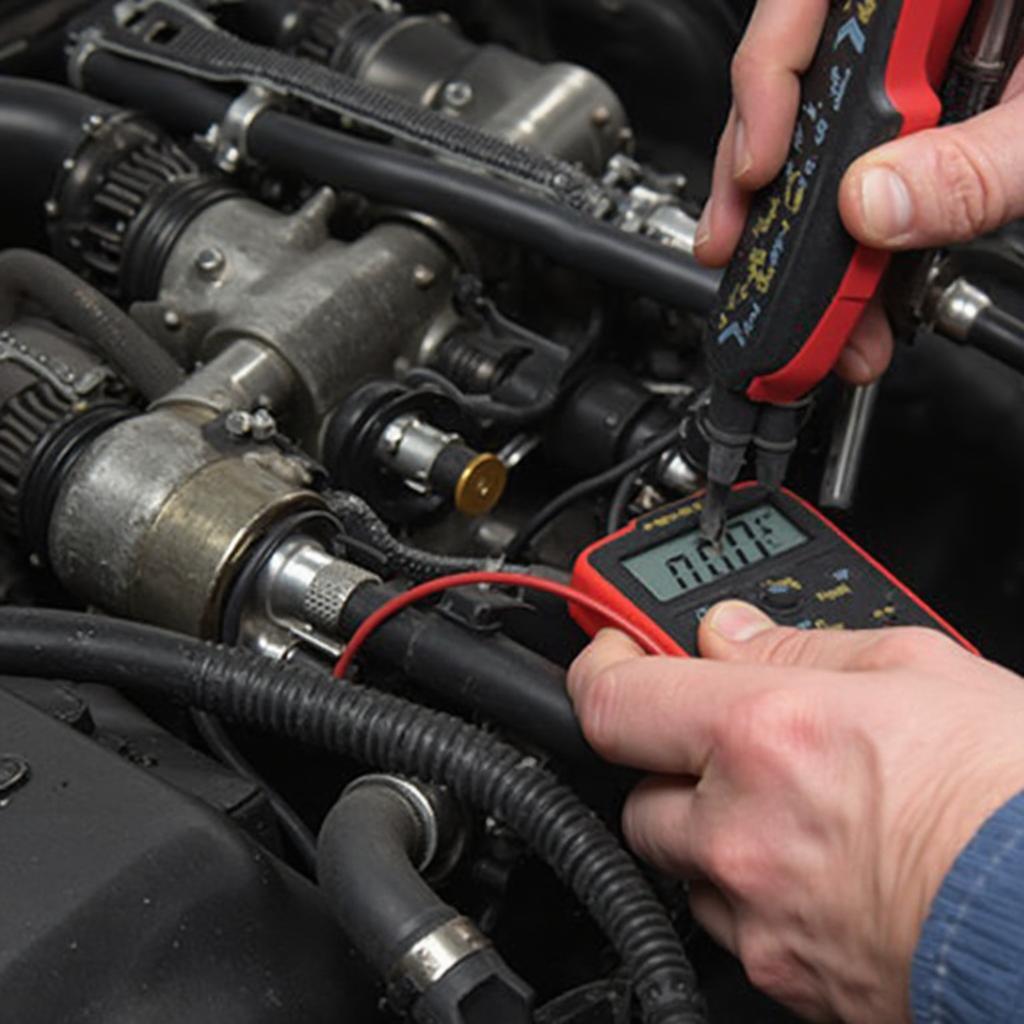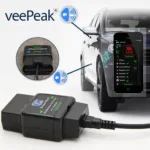The dreaded P0420 code. If you’re a Nissan owner, seeing this on your OBD2 scanner can be unsettling. This article will delve into everything you need to know about the nissan obd2 code 420, from its causes and symptoms to diagnostic procedures and solutions. We’ll explore why it occurs, what it means for your vehicle, and how to address it effectively.
Understanding the P0420 diagnostic trouble code (DTC) is crucial for maintaining your Nissan’s performance and emissions. This code indicates that the catalytic converter’s efficiency is below the threshold set by the manufacturer, specifically on Bank 1. This often signifies a problem with the catalytic converter itself, but other underlying issues can trigger this code. Ignoring this code can lead to further damage and costly repairs down the line.
You can find more information about Nissan OBD2 codes on our page dedicated to 2013 nissan altima obd2.
What Causes Nissan OBD2 Code P0420?
Several factors contribute to the P0420 code appearing in Nissan vehicles. One common culprit is a failing catalytic converter. Over time, the internal honeycomb structure of the converter can become clogged or damaged, reducing its efficiency. However, before jumping to conclusions and replacing the converter, consider these other potential causes:
- Oxygen Sensor Issues: Faulty oxygen sensors (upstream or downstream) can provide inaccurate readings to the engine control unit (ECU), triggering the P0420 code.
- Exhaust Leaks: Leaks in the exhaust system, especially before the catalytic converter, can disrupt the exhaust gas flow and affect the oxygen sensor readings.
- Engine Misfires: Unburned fuel from engine misfires can overheat and damage the catalytic converter.
- Rich Fuel Mixture: A fuel mixture that is too rich can overload the catalytic converter and reduce its efficiency.
- Damaged Catalytic Converter: Physical damage to the catalytic converter, such as from impact or debris, can also cause the P0420 code.
Symptoms of OBD2 Code P0420 in Nissan Vehicles
Recognizing the symptoms of a P0420 code can help you address the issue promptly. While the check engine light is the most obvious indicator, other symptoms may include:
- Decreased Fuel Economy: A less efficient catalytic converter can lead to increased fuel consumption.
- Reduced Engine Performance: The engine may feel sluggish or lack power.
- Rotten Egg Smell: A strong sulfur smell from the exhaust can indicate a failing catalytic converter.
- Failed Emissions Test: The P0420 code will likely cause your vehicle to fail an emissions test.
How to Diagnose Nissan OBD2 Code P0420
Diagnosing the P0420 code requires a systematic approach. Here are some steps you can take:
- Retrieve the Code: Use an OBD2 scanner to retrieve the code and any other stored codes.
- Inspect for Exhaust Leaks: Check for any visible cracks or holes in the exhaust system.
- Check Oxygen Sensor Readings: Use a scan tool to monitor the oxygen sensor readings and compare them to manufacturer specifications.
- Test the Catalytic Converter: Perform a backpressure test to assess the health of the catalytic converter.
For specific information on Nissan Titan models, refer to our guide on obd2 code 420 nissan titan.
Fixing Nissan OBD2 Code P0420
The solution to the P0420 code depends on the underlying cause. Here are some possible fixes:
- Replace Oxygen Sensors: If the oxygen sensors are faulty, replacing them is often the most straightforward solution.
- Repair Exhaust Leaks: Repairing any exhaust leaks can restore proper exhaust flow and prevent inaccurate sensor readings.
- Address Engine Misfires: Fixing any engine misfires will protect the catalytic converter from further damage.
- Adjust Fuel Mixture: If the fuel mixture is too rich, adjusting it to the correct ratio can improve catalytic converter efficiency.
- Replace Catalytic Converter: If the catalytic converter is damaged or failing, replacement is usually necessary.
You may also find helpful information about Nissan Versa models on our obd2 nissan versa 2009 page.
Conclusion
The nissan obd2 code 420 can be a complex issue, but understanding its causes, symptoms, and diagnostic procedures can help you address it effectively. Don’t ignore this code. Prompt diagnosis and repair can save you money and ensure your Nissan runs smoothly and efficiently.
FAQ
- Can I drive with a P0420 code? While you can technically drive with a P0420 code, it’s not recommended. Ignoring the code can lead to further damage and costly repairs.
- How much does it cost to fix a P0420 code? The cost varies depending on the cause. Oxygen sensor replacement is less expensive than catalytic converter replacement.
- How long does a catalytic converter last? Catalytic converters typically last around 100,000 miles, but various factors can affect their lifespan.
- Can a bad gas cap cause a P0420 code? While a bad gas cap can trigger other codes related to the evaporative emissions system, it’s unlikely to cause a P0420 code directly.
- Is it illegal to drive with a P0420 code? Driving with a P0420 code can cause your vehicle to fail an emissions test, which may be illegal in some areas.
- Can I clean my catalytic converter? Some cleaning methods exist, but they are not always effective and may not address the underlying problem.
- How can I prevent a P0420 code in the future? Regular maintenance, including tune-ups and addressing engine misfires promptly, can help prevent catalytic converter problems.
Need help with your OBD2 codes? You might find our resource on 2000 integra obd2 check codes helpful, even if you don’t own an Acura Integra. For information about the Nissan Altima’s OBD2 protocol, visit our page on the nissan altima obd2 protocol.
Need help? Contact us via WhatsApp: +1(641)206-8880, Email: [email protected] or visit us at 789 Elm Street, San Francisco, CA 94102, USA. We have a 24/7 customer support team ready to assist you.


